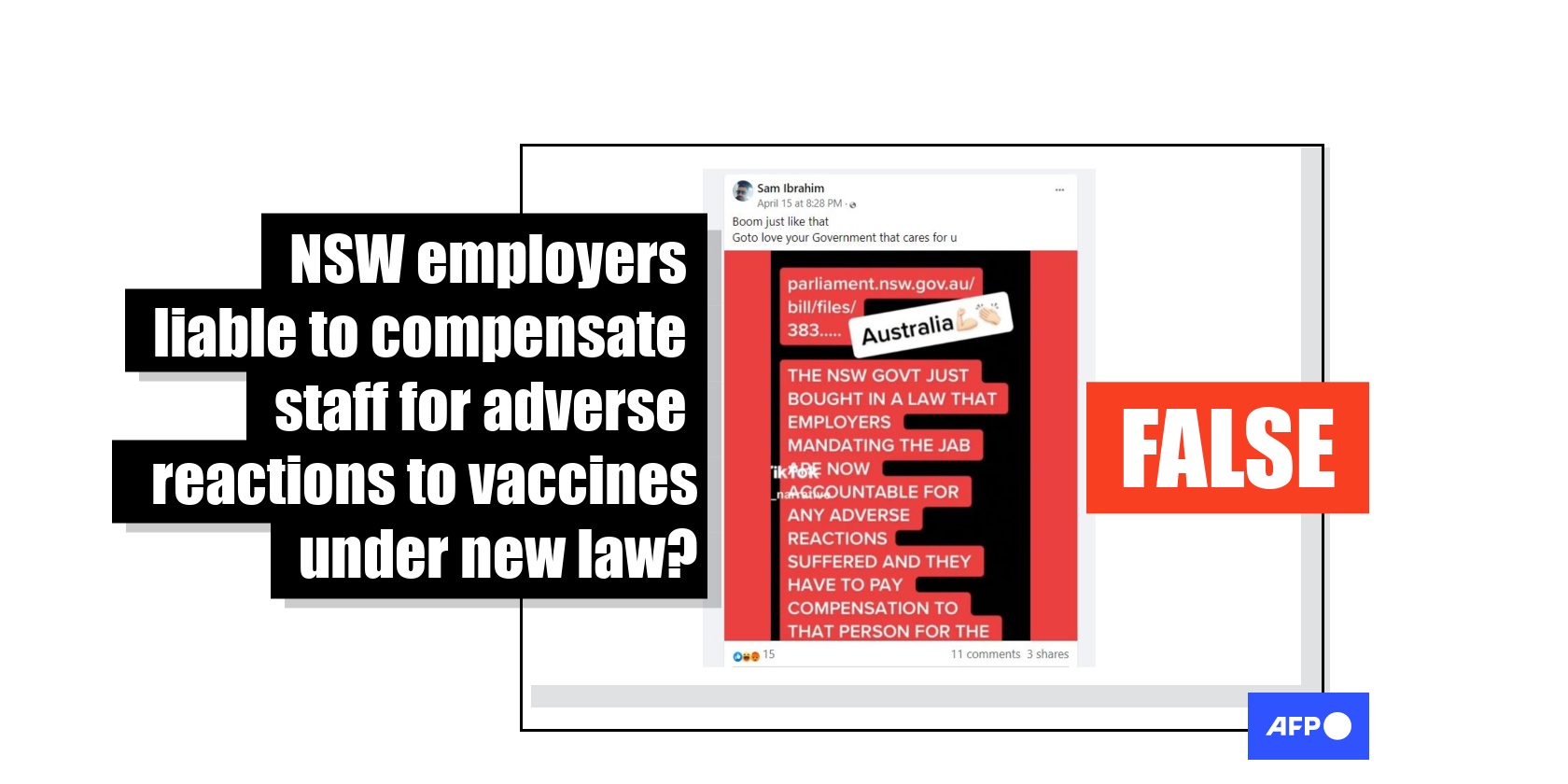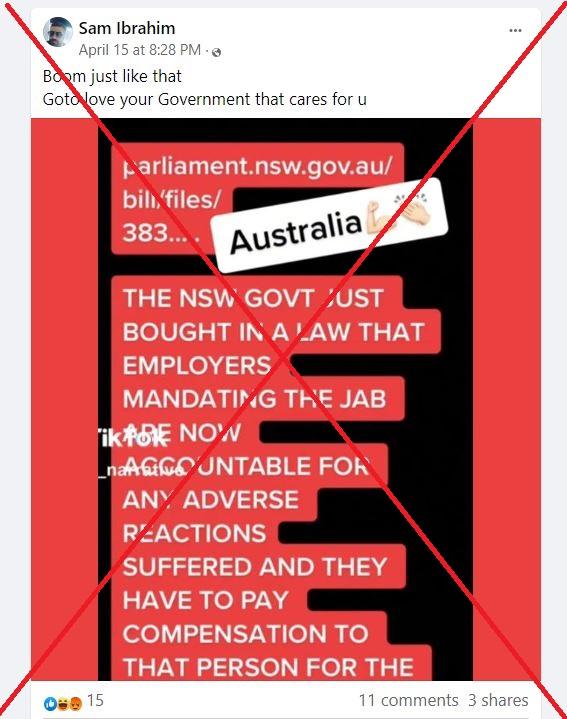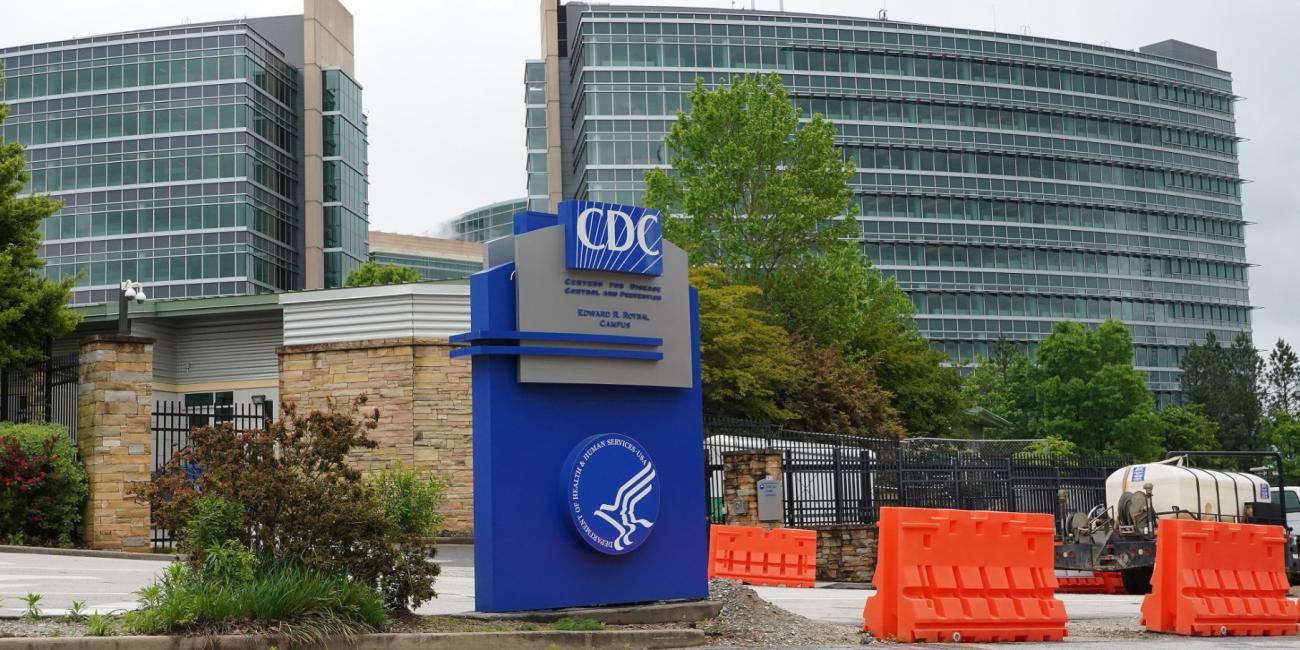
False posts share failed vaccine compensation proposal as 'new Australian state law'
- This article is more than two years old.
- Published on May 2, 2023 at 08:38
- 3 min read
- By Kate TAN, AFP Australia
"Boom just like that Goto (sic) love your Government that cares for u," reads a Facebook post shared on April 15.
The post shares a screenshot that reads: "The NSW govt just bought in a law that employers mandating the jab are now accountable for any adverse reactions suffered and they have to pay compensation to that person for the rest of their lives even if they are not working for them anymore."
The screenshot also includes a snippet of a URL that appears to link to the NSW parliament.

The false claim has been shared over 2,500 times on Twitter, as well as on Facebook here, here and here.
But keyword searches on NSW Legislation, the website that lists all laws passed in the state, found no such vaccine compensation measure had been passed as of May 2 (archived link).
Bill voted down
While former member of parliament Fred Nile introduced a similar proposal in February 2021, it did not become law (archived links here and here).
Nile's proposal, the "Public Health Amendment (Vaccination Compensation) Bill 2021", suggested amending the Public Health Act to compensate workers who "suffer injury, loss or damage as a result of a requirement to be vaccinated" (archived link).
It adds the employer "continues to be liable to pay compensation to the worker until the worker's death, even if the worker ceases to be employed".
At the time, Australia was about to launch its Covid-19 vaccination programme.
The parliament website shows the bill was "negatived", meaning it had not been passed (archived link).
Hansard -- the official record of events in parliament -- also shows the bill was voted down on February 23, 2022 (archived link).
Speaking on behalf of the government, the then-minister for regional transport and roads Sam Farraway said the government does not support the bill "for public health reasons".
"The Government is concerned that the bill would undermine public confidence in vaccination and reduce the number of employer-based vaccination programs," he said.
"The existing workers compensation scheme in New South Wales provides protection for workers who suffer adverse events following vaccination," he added.
Compensation mechanisms
According to lawyer Bill Madden, a specialist in personal injury law, workers can claim payment for an adverse vaccination reaction under workers' compensation laws in their states (archived link).
"Workplaces which mandated the Covid-19 vaccine could be subjected to workers' compensation claims, in some circumstances," Madden told AFP on April 28.
Australians can also claim compensation for Covid-19 vaccine-related adverse events via a nationwide COVID-19 Vaccine Claim Scheme (VCS) which launched on August 28, 2021 (archived links here and here).
But Madden said workers "will not recover the same loss (such as a loss of income or a treatment cost) twice" if they make a worker's compensation claim and then a VCS claim.
Vaccine rollout
Australia has administered more than 65 million doses of the Covid-19 vaccine since the programme was launched in February 2021, according to Australia's drug regulator, the Therapeutic Goods Administration (TGA) (archived link).
In its April 20 vaccine safety report, the regulator says there are about 2.1 adverse event reports per 1,000 doses for these vaccines.
"The most frequently reported include injection-site reactions (such as a sore arm) and more general symptoms, like headache, muscle pain, fever and chills. This reflects what was seen in the clinical trials," the report says.
The TGA continues to recommend several Covid-19 vaccines as the vaccination is "the most effective way to reduce deaths and severe illness from infection".
"The protective benefits of vaccination far outweigh the potential risks," it adds.
Copyright © AFP 2017-2026. Any commercial use of this content requires a subscription. Click here to find out more.
Is there content that you would like AFP to fact-check? Get in touch.
Contact us




